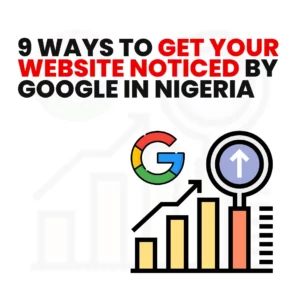If you have a website in Nigeria, vital to ensure safety. A secure website is not only crucial for protecting the data on your website, but it also helps your visitors and buyers trust you. But unfortunately, the internet can be dangerous, and Nigerian websites are not safe from the dangers it brings. This article will tell you how to secure your website in Nigeria. We’ll walk you through the most common website security risks and give you the best practices to keep hackers, malware, and other cyber threats away from your site.

Common Website Security Risks in Nigeria
As a Nigerian who wants to use the Internet, essential to know about the typical security risks you may face on websites. By knowing what could go wrong, you can take the steps you need to protect your website.
Hacking
Hackers can get into your website and steal private information, like information about your customers and finances. They can also change your website’s look, making it useless. Malware can get on your website and spread to your visitors’ devices, hurting your website and viewers.
Phishing
This is when someone tries to get private information like passwords and credit card numbers by being dishonest. In Nigeria, this can happen through fake emails or text messages that look like they came from an authentic source.
Unsecured Wi-Fi
Your website can also be at risk if you use a Wi-Fi network that is not safe. When you use an unsecured Wi-Fi network to get to your website, anyone on the same network can capture and read your data. This includes your login information and other private data.
By knowing about these common website security risks in Nigeria, you can take the steps to keep your website safe. In the following sections, we’ll show you the best ways to protect your website from cyber threats and keep it secure.
How to Secure Website Infrastructure
You must have a secure website framework to keep your website safe from cyber threats in Nigeria. Here are some best practices you can use to protect the infrastructure of your website:
1. Choose a website hosting safe service
A good website hosting service will protect your website from threats with strong security measures. They will also offer regular backups, so you can quickly fix your website if there is a security breach.
2. Ensure that your website’s software is always up-to-date
This includes your content management system (CMS) and any tools you use. Developers release changes often to fix security holes, so important to ensure your software is always up to date.
3. Use SSL certificates on your website
This ensures that all information sent between your website and your users’ browsers is encrypted and safe. SSL certificates also add a layer of security by ensuring your website is who it says it is.
4. Ensure you back up your website info often
This is important in case of a security breach or something else unexpected. If you have a recent backup, you can quickly fix your website and do as little damage as possible.
Read Also: How Much Does It Cost to Build a Website in Nigeria?
How to Secure User Access
To keep your website safe from cyber threats in Nigeria, important to ensure users can view it safely. Here are some best practices you can use to keep users from getting in:
1. Use strong passwords
Weak passwords are easy for hackers to figure out, which makes it easy for them to get into your website. So instead, choose passwords that are hard to guess using a mix of letters, numbers, and special characters.
2. Limit login attempts
This stops hackers from trying to figure out your password more than once. After a certain amount of failed login attempts, you can set up your website to lock people out.
3. Use Two-factor verification
This means adding an extra layer of security by making users provide a second form of authentication, like a code sent to their phone and their password.
4. Regularly review user access
Make sure that only authorized users can view your website. Take off any users who no longer need access and check each user’s entry permissions.
How to Protect Against Malware and Viruses
Protecting your website from malware and viruses is vital to protect it from online threats in Nigeria. Here are some of the best ways to protect yourself from adware and viruses:
Install anti-virus and anti-malware software. This software can help you find and eliminate any harmful software on your website. Make sure that the software is always up to date and running.
Regularly scan your website for malware and viruses. You can use online scanning tools to see if your website has any possible problems. This helps find issues early and stops them from getting worse.
Implement a firewall. Firewalls can help stop people from getting into your website without your permission. This keeps bugs and viruses from getting into your website.
Be cautious when downloading and installing software or plugins. Ensure the software you download is from a well-known creator and only comes from trusted sources.
Make sure to back up your website’s info often. This ensures you have a recent backup in case there is a security breach or something else goes wrong.
How to Secure Transactions on Your E-commerce Website
Secure transactions are essential to ensure that your Nigerian customers’ private information, like credit card numbers, is safe when they buy something from your website. Here are some of the best ways to keep deals safe:
1. Use safe payment platforms
A payment gateway is a service that allows and handles internet transactions safely. Ensure that your payment method meets the Payment Card Industry Data Security Standards (PCI DSS). This means that it is PCI DSS compliant.
2. Use an SSL certificate
This ensures that all contact between your site and your customers’ browsers is encrypted and safe. SSL certificates also add a layer of security by ensuring your website is who it says it is.
3. Implement fraud detection and prevention measures
This includes setting up systems that keep track of transactions and look for strange behaviour, like when the same IP address is used for more than one transaction.
4. Regularly review transaction logs
This lets you find any possible problems or strange behaviour. Make sure your customers know what you’re doing to keep them safe. This can be done, for example, by putting security badges or seals on your website to show that it is safe.
By following these best practices, you can ensure that your transactions in Nigeria are secure and safe from online threats. This not only keeps your customers’ private information safe but also builds trust in your website.
Team Training on Website Security
Keeping your website safe from online threats in Nigeria requires training your team. Here are some best practices for training your team:
Ensure that everyone on the team knows about security risks. You can do this through training workshops or regular emails about security. Ensure everyone on your team knows how important strong passwords are, what hacking is, and what other common security risks there are.
Train your team on the best ways to keep user access safe. This can include teaching people how to make strong passwords, use two-factor security, and limit the number of times they can try to log in.
Ensure everyone on your team knows how important it is to update software and plugins regularly. Outdated software and apps can have holes that hackers can use to get into your system.
Train your team members on how to spot security problems and what to do about them. This includes teaching how to spot suspicious behaviour, report security breaches, and what to do when a breach happens.
Ensure that everyone on your team knows how important it is to back up info. Teach them how to back up website data regularly so that data can be recovered if there is a security breach or something unexpected happens.
By following these best practices, you can ensure your team has everything it needs to keep your Nigeria website safe from online threats. Training your team is one of the most important things you can do to keep your website safe and protect your business and customers from security risks.
10 Tips to Protect Your Website From Hackers in Nigeria
Protecting your website from hackers is vital if you want to ensure that your website and information about your customers are safe in Nigeria. Here are ten ways to keep hackers from getting into your website:
1. Use strong passwords that are different for each user account. Don’t use passwords like “password123” or “123456” that are easy to figure out.
2. Use verification with two factors. This adds an extra layer of security by needing a second form of authentication, like a code sent to your phone, in addition to your password.
3. Make sure your apps and add-ons are up to date. Hackers can use holes in outdated software for a long time.
4. Use a secure web hosting provider. Choose a server company that puts security first and has a good name.
5. Regularly back up your website data. This ensures you have a recent backup in case of a security breach or something unexpected happens.
6. Use a web application firewall. A firewall can help stop hackers from getting into your website by preventing people who shouldn’t be there from getting in.
7. Use HTTPS and SSL certificates. This ensures that all contact between your site and your customers’ browsers is encrypted and safe.
8. Check your website for flaws regularly. You can use online checking tools to determine if your website has any possible security holes.
9. Protect yourself from DDoS attacks by putting in place security measures. Setting up firewalls, using load balancers, and watching network data are all ways to do this.
10. Teach your team the best ways to keep things safe. Ensure your team knows the risks and what to do if there is a security breach.
Read Also: How to Choose the Best Hosting Service in Nigeria
Frequently Asked Questions About Website Security in Nigeria
What is website security?
Website security refers to the steps you take to keep hackers, malware, and phishing scams from getting into your website.
What are some common website security risks in Nigeria?
Hacking, malware outbreaks, phishing scams, and DDoS attacks are all common threats to website security in Nigeria.
How can I protect my website from hackers in Nigeria?
You can protect your website from hackers in Nigeria by using strong passwords, implementing two-factor authentication, keeping your software up to date, using a secure web hosting provider, regularly backing up your website data, using a web application firewall, using HTTPS and SSL certificates, periodically scanning your website for vulnerabilities, putting in place security measures to protect against DDoS attacks, and training your team on security best practices.
What is a web application firewall?
A web application firewall (WAF) is a type of firewall that is made to keep cyber attacks out of web apps. A WAF can help block hackers from getting into your website by stopping them from accessing it without your permission.
What are SSL certificates?
Hypertext Transfer Protocol Secure, or HTTPS, is a more secure version of the standard HTTP protocol. SSL (Secure Sockets Layer) certificates are used to encrypt data sent between a website and a user’s browser. This makes sure that all contact between the two is safe.
Why is website security important in Nigeria?
Website security is vital in Nigeria because cyber threats are becoming more common. Companies and people can lose a lot of money and hurt their reputations if their websites or data are hacked or stolen. Therefore, you must protect your website and customers’ information by having a safe internet presence in Nigeria.
Conclusion
As a web creator in Nigeria, I know how important it is for my client’s sites to be safe. Using the tips in this article, you can keep your website safe from cyber dangers and your online presence secure. But if you need more skills or time to put these security steps in place yourself, I’m here to help. As a website designer in Nigeria, I can help keep your website safe and give you peace of mind by offering website security services. So contact me immediately to discuss how I can help you keep your website safe and your online profile in Nigeria safe. So be sure to protect your website from online threats before too late; do it now.



